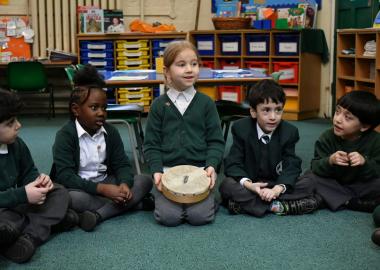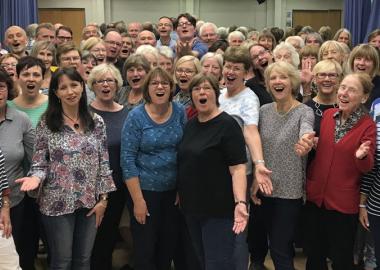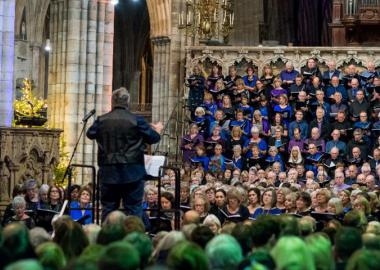This resource is part of our ‘Increasing your income’ guidance, which looks at ways to find and grow sustainable and diverse income for your group. It will focus on donations, fundraising events and sponsored challenges, not forgetting Gift Aid for all of these options.
Before we go into the detail it is worth remembering that many of the ideas below involve asking your members and their relatives and friends to give money. This is not an uncommon situation for music groups and in our experience is the generally accepted norm. But it’s worth considering that there is probably a limit.
If people are asked for a donation at each concert (in top of the ticket price) and asked to buy a raffle ticket, and then to attend a fundraising event every 6 months they might think it is too much and feel less inclined to offer support. Try to take a balanced view of how often and what you are asking people to give. And remember that donations are just one way to increase your income – see our ‘Increasing your income overview’ for more information.
Donations
Asking for money can be difficult. But people are willing to give to a good cause that they value, so direct requests for donations can work. If done well they can even become regular. Being clear about what you want the money for and how a donation will be used and help your group will encourage people to give.
It is tempting to think that you can only ask for donations for a big, exciting cause – but asking for the smaller more mundane things can work too.
- Perhaps the most common way to ask for donations is a ‘bucket shake’ approach. This tends to work better for a big and exciting cause – raising money for a new piano for example. In a more cashless society, you should consider supplementing this with a contactless, card-based method of accepting payments such as Goodbox or iZettle. It is still possible to claim Gift Aid on this type of income:
- Find out more: Contactless payments and card readers
- Find out more: How to claim Gift Aid for your group
- For a smaller project – such as new staging, or chairs for the audience, a more direct and specific ask might be a better approach.
- You could have a short article in your programme and on your website or social media, explaining that you need new staging and ask for a set fee (or range of fees) to contribute. For example
- A donation of £2 from each audience member will raise half of the money we need.
- A £2 donation will buy x amount of sheet music, £5 will buy x amount
- Think about how you can reward your donors – could you offer specific rewards: donate £50 your name will be on a staging leg or chair, £100 and you’ll receive VIP tickets to our next season. But be aware that there are very specific rules around providing benefits or rewards to donors and your ability to claim Gift Aid on the income received. For larger charities, there may also be VAT and tax implications. Find out more: How to claim Gift Aid for your group.
There are lots of online platforms to help you take donations and manage campaigns. They take a fee but generally make it easier for people to donation and reduce your admin. Read our guidance: Online donation platforms to find out more.
Fundraising Events
There is nothing wrong with a good old-fashioned fundraising event. There are loads of options and you can be as traditional or creative as you like. They are potentially more sustainable than sponsorship challenges (see below) as they can be become an annual or bi-annual event. They can also become a fixture in your local community helping to raise your profile and build your reputation at the same time as your income.
Musical fundraising events: why not use your talents to raise money? Take your performances to public spaces and the masses and shake a bucket to raise money and your profile.
- Put on your own performance: shopping centres, train stations, park band stands, town squares, visitor farms, tourist attractions – basically any public space where people go to enjoy themselves is a potential opportunity. It’s important to check you have permission for whatever you are doing. The best starting point is the people that own or manage the space. If it is a publicly owned area (parks, squares etc.) your local authority is the best starting point.
- Piggy-back on other events: think about community events that are taking place near you – could you get involved, play some music and shake a bucket? School and village fetes, May Day events, local sports tournaments, street parties, fun runs, garden parties – the list is endless.
- It’s not just about raising money: remember that these types of events are a great way to boost your profile and find new members and audiences too. Make sure you take advantage this; have some people available to chat to passers-by, spread the word and hand out leaflets. You could even do a special discount promotion on membership fees or concert tickets for people at the event. If it’s a community event can you offer tickets as a prize in the raffle?
Non-musical events: a non-musical fundraising event can be a great way to bring people together and raise the profile with those who might not normally come to a concert. And of course, you can always sneak a performance in somewhere along the way.
Some things to think about:
- Charging for tickets is normally the bulk of your event income but this can be supplemented in many ways – raffles, games refreshment sales etc.
- The more you get for free the more you raise - so don’t be afraid to ask people to volunteer their time and talents – helping at the event, baking cakes, donating prizes etc.
- Think about sponsorship options with local businesses. Maybe they can donate a prize or their skill and expertise in return for some free publicity or advertising. See Increasing your income: sponsorship for more information.
There are many different types of events you can do. Think about the talent and resources you have at your disposal and make the most of them. If you have a group full of bakers – put on a cake sale. Some common examples are below – as ever it’s not exhaustive and there is lots of room to be creative.
- Quiz nights
- Cake sale
- Fashion Shows – work with a local 6th form school or college to put on a Fashion Night
- Auction nights
- Jumble Sales
- Speed dating
- Talent contest
For any event, you must carry out a risk assessment in advance, make appropriate health and safety arrangements and ensure you have sufficient insurance cover in place. There may be other considerations, permissions and licences needed, particularly around location, food hygiene and the provision of alcohol. Your local authority will be able to provide more information. Find out more in our event planning guidance.
Lotteries: Lotteries with their element of chance, can be an exciting way to fundraise. These include raffles, tombolas and sweepstakes. In most cases, where they take place within a closed group or event with all profits clearly benefitting your cause, they are straightforward to run.
But they are a form of gambling (as are race nights, poker or bingo nights) and are regulated by the Gambling Commission and subject to a Code of Fundraising Practice to protect donors. Some types of lottery require a licence from your local authority. Check out the Gambling Commission website before planning any such event to make sure you stay within the law.
Charity auctions: Auctions can be a fun way to raise money for your group, particularly at events. Do you have contacts who could provide a special item or experience attractive to your audience, members and other supporters? Do you know someone who could organise and deliver an auction in an entertaining way? Charity auctions usually involve celebrity enhanced items such as signed football memorabilia, or treats where the bidder will pay more than the market value of the items in support of the group.
It is not possible to claim Gift Aid on celebrity enhanced items but it may be possible where the successful bid includes a donation element over and above the commercial value of an item. In this case, the bidders must know the commercial value in advance (e.g. by publishing this in a programme).
Sponsored activities and challenges
From climbing Kilimanjaro to swimming 100 lengths of your local pool, sponsored challenges are increasingly popular and a good way to raise money (and profile) for your group.
Your members will have many non-musical talents that could help raise money for your group, and not just members either – think about their families as well. There are lots of common types of challenges (runs, walks, bike rides etc.) and room to be creative too.
As with donations it can be useful to be clear about what you are raising money for and examples of how much buys what.
There are lots of websites to help raise money for sponsored events where you can build a profile, add photos, keep people updated, collect money online and track your targets. These will also claim Gift Aid on your behalf to boost the value of eligible donations.
Whilst challenges can be a great way to raise money and promote your group, they are not necessarily a sustainable source of income. There are also lots of competing causes and can be a big commitment for those involved. As such they are perhaps best viewed as occasional activities that can boost your income from time to time – maybe to help towards specific projects.
A musical challenge: can you use your talents in a musical challenge? If the challenge is linked to your activities it might be easy to raise support and get buy-in. Some examples:
- A 24 hour sing-a-thon – take it in shifts to sing for 24 hours – members and audiences can come and go as they please
- Perform All 9 of Beethoven’s symphonies on one weekend
- Grade-one-a-thon – get sponsored to learn a new instrument
- ‘Buy a bar’ the number of bars bought determines the number of bars of a new piece written by the group or MD
If you buy a place in a challenge event for a participant, it can restrict the ability to claim Gift Aid on sponsorship donations received from family members.
Easy fundraising
Shopping online can raise money for your group. It really is that easy!
- You can register your cause on your chosen site and certain online shops will donate a percentage of the money spent to your cause. It doesn’t cost the buyer anything.
- Easyfundraising and The Giving Machine are the two most well-known examples, On Easyfundraising, supporters can download the toolbar for an automatic reminder when they visit relevant websites.
- Once you’ve registered remember to tell your members (and anyone else who will listen) and then tell them again. Having a regular announcement at rehearsals is a good way to keep reminding people as is a link at the bottom of group emails.
Because the donation is from a company (e.g. Easyfundraising), it is not possible for your group to claim Gift Aid on these donations.
Gift Aid and donations
Gift Aid is a tax relief offered by the government whereby you can claim an extra 25p for every £1 donated by a British tax payer.
The process for claiming gift aid is not too complicated – it will require a bit of time and effort to set up initially but once you understand the process and have everything in place, the work from year to year is not too much, especially compared to the rewards. We have guidance about Gift Aid and how it works but briefly:
-
If people give a specific and direct donation in monetary form (cash, bank payment or cheque) , without the expectation of receiving something in return and assuming they are a UK tax payer, you can claim Gift Aid on that donation. You will need them to complete a Gift Aid declaration form to do this.
- It is also possible to claim Gift Aid on money collected where you don’t necessarily know who gave the money and where you don’t have a declaration form (e.g. bucket shakes, door donations instead of tickets) under the Gift Aid Small Donations Scheme. There are rules about when and how you can do this – so make sure you read our guidance first.
Further Reading
- Increasing your Income overview
- Increasing your income, part 1: Membership subscriptions
- Increasing your income, part 2: Ticket sales and events income
- Increasing your income, part 3: Sponsorship
- Increasing your income, part 4: Friends schemes
We hope you find this Making Music resource useful. If you have any comments or suggestions about the guidance please contact us. Whilst every effort is made to ensure that the content of this guidance is accurate and up to date, Making Music do not warrant, nor accept any liability or responsibility for the completeness or accuracy of the content, or for any loss which may arise from reliance on the information contained in it.










